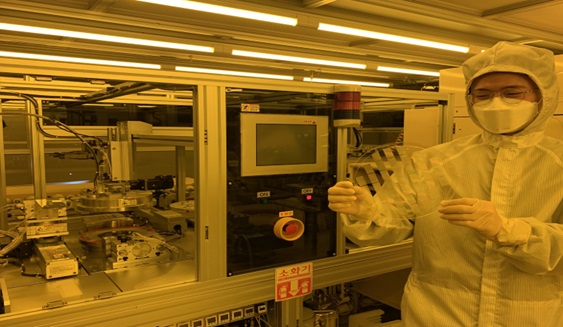 |
A Hunetplus researcher works on the company’s 2,000 ppi ultra-high-resolution mask at the firm’s facility in South Korea. (Hunetplus) |
Hunetplus, a next-generation semiconductor and display materials company, said Thursday that it has successfully developed a deposition mask for OLED display panel fabrication using organic and inorganic hybrid materials.
Conventional deposition masks used in OLED displays, also known as fine metal masks, are metallic plates that deposit light-emitting organic materials to an accurate location on a substrate during the OLED display manufacturing process. By doing so, they ensure the precise deposition of organic material onto a thin-film transistor pixel area to create a visual image.
However, the resolution of these conventional masks is limited to only 500 pixels per inch, or ppi. They are also expensive and hard to scale up for larger displays due to issues like their hefty weight.
To address this, Hunetplus has successfully developed a groundbreaking deposition mask that is lighter and provides higher-resolution images at a lower production cost.
This comes as part of efforts to develop core technology for next-generation display devices. Specifically, the company has been focusing on developing 6,000 ppi display technology, which is regarded by the Ministry of Science and ICT as a key for developing extended reality devices.
In particular, the mask enables the production of OLED panels with ultra-high resolutions ranging from 2,000 to 8,000 ppi, Hunetplus said.
It thus presents the potential for improved resolutions in mobile phone displays as well as augmented and virtual reality microdisplays.
The mask will likely gain considerable popularity, Hunetplus predicted, as the global market for fine metal masks in OLED displays is expected to show an average annual growth rate of over 30 percent according to market research firm QYResearch.
The recent fierce competition for extended reality device development -- such as Apple's "Vision Pro" and Meta's "MetaQuest" -- also sets the solid groundwork for the product’s success both domestically and abroad.
Notable customers will likely include tech giants such as Samsung, LG, Sony, Facebook and Apple.







![[Herald Interview] How Gopizza got big in India](http://res.heraldm.com/phpwas/restmb_idxmake.php?idx=644&simg=/content/image/2024/11/20/20241120050057_0.jpg)